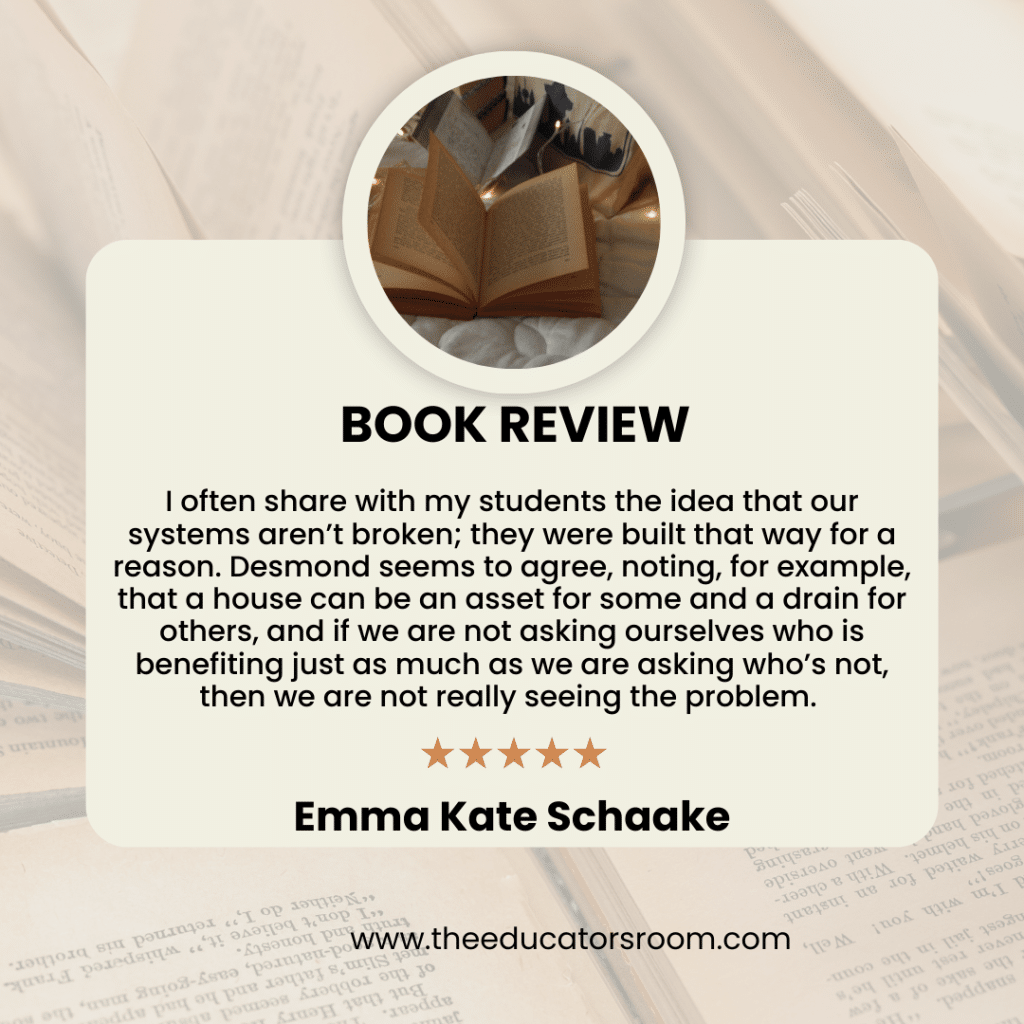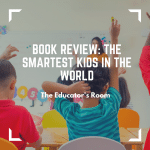The Pulitzer Prize-winning author of Evicted, Matthew Desmond, is out with a new book, Poverty by America that speaks to the problem of poverty, the heartbreaking reasons why it persists, and what can be done to solve it.
Desmond explains that “Poverty isn’t a line. It’s a tight knot of social maladies. It is connected to every social problem we care about–crime, health, education, housing,” and it is persistent.
As a teacher for seven years, I was particularly interested in the implications of this text’s findings for educators.
Desmond argues that for decades, the poverty discussion has been framed around questions about the poor themselves (work ethic, welfare benefits, or personal choices) instead of the weak and ineffective policy that traps and exploits people in poverty to begin with. And if these conditions continue to perpetuate, who is benefiting?
Poverty and Student Success
First, a few facts to establish the problems Desmond lays out as it relates to our students. Over a million public school children are homeless or are experiencing housing instability, and one in eight children lives in poverty.
Poverty “shrinks the mental energy” that people can dedicate to decision-making, instead forcing them to focus on the latest stress “at the expense of everything else.” This is sometimes called the “bandwidth tax,” which argues that “being poor reduces a person’s cognitive capacity more than going a full night without sleep.”
Desmond says that “poverty reduces people born for better things,” and we know that students who experience housing instability or witness violence in their neighborhoods are not going to perform well on cognitive tasks. No matter how hard they try or how much “grit” they have.
Studies show that growing up in a poor neighborhood (due to factors like predatory lending, redlining, or unfair landlord practices) “is the equivalent of missing one year of school when it comes to verbal ability” and the “achievement gaps between rich and poor children form and harden before kindergarten.”
And yet, the advantaged continue to benefit, and the poor continue to fail. Spoiler alert, it’s not because the poor are lazy or making ill-advised choices. It’s because they don’t have any.
As Desmond puts it, “Poverty isn’t simply the condition of not having enough money. It’s the condition of not having enough choice and being taken advantage of because of that.”
Private Opulence, Public Squalor
What I found to be the most intriguing if the most disheartening, argument Desmond makes is how we create and maintain “private opulence and public squalor.”
Essentially, those who are not living in poverty have no incentive to change the system because it works for them. Those who have the means to improve their conditions do so.
This leads to “‘the commodification of opportunity’ where those engines of social mobility now cost something.” Think of college opportunities; shoot, think of preschool admissions or the cost of childcare!
Though he doesn’t mention private or charter schools, they’re exactly what I thought of when Desmond says that people “wish for the freedom to withdraw from the wider community and sequester [themselves] in a more exclusive one, pulling further and further away from the poor until the world they inhabit becomes utterly unrecognizable to us.”
Those with means can seek other options and often do. Principals of public schools send their own kids out of the district because they just can’t risk their futures. Meanwhile, public services like education, housing, and transportation become poorer and are increasingly only used by the poor themselves, perpetuating the cycle of limited choice and limited opportunities.
Desmond explains that while the middle and upper classes demonize those benefiting from government programs like food stamps as lazy, they themselves rely on “invisible” programs like tax breaks, employer health insurance, and college savings accounts to create better lives for themselves and their children.
In fact, the richest families “receive almost 40 percent more in government subsidies than the poorest American families.” And these subsidies only benefit affluent families because of the privileges they already have by nature of their affluence; mortgage interest deductions rates as homeowners or extra cash to put into a 529 college savings plan, just to name a few.
Families with the means to do so, through many of these benefits, save money to “fuel intergenerational wealth creation but collectively spend less on expanding opportunity to all children.” Meanwhile, poor families are actually being made to pay for their poverty, quite literally in cases such as overdraft fees that disproportionately affect accounts holding less than $350.
Race & Class
Desmond argues that as a result of these inequitable benefits and choices creating private opulence and public squalor, our children’s schools today “are less economically diverse than their grandparents’ schools were,” and most are still starkly separated by race, even in the decades after Brown vs. Board of Education.
Because racism and classism are often inextricable, Brown’s forced busing and integration meant “many came to view taxes as something like compulsory donations to Black people,” and White people withdrew from public spaces, then from entire cities, taking their tax dollars with them.”
After Brown and in the wake of the gains of the Civil Rights movement, “Most (W)hites began voting according to their perceived racial interest rather than their economic ones,” resulting in a public world that was left for Black people and a new “private one was created for (W)hites.”
We can see echoes of these ideas today, as racist attitudes, euphemized as “a fear of cultural displacement,” led droves of the White working class to vote for Trump in 2016. America is more racially diverse than ever, yet White people still tend to live amongst themselves, reaping the benefits of a housing market that caters to their needs at the exclusion of minoritized groups.
Pie in the Sky Solutions
The last few chapters that offered solutions to this wide-reaching issue of poverty were the least convincing to me. Not because Desmond doesn’t offer good ideas (such as empowering the poor through creating new labor unions, strengthening public housing, ending overdraft fees, and expanding reproductive choice) but because there are obvious solutions, but our divided politics make them seem insurmountable.
He calculates that 177 billion dollars would end poverty in America as we know it. That number is huge, but it is actually less than one percent of our GDP and less than what Americans throw away in food every year.
With that amount, we could ensure that every person in America has a safe, affordable place to live, end hunger and homelessness, lower eviction and crime rates, and secure futures for our children.
Although he does suggest ideas for individuals to make a difference (divesting from companies with unfair labor practices, for one), I am stuck on the 1 trillion dollars the IRS estimates is lost due to tax avoidance from corporations and wealthy families. If this amount was collected, as it is legally supposed to be, we could end poverty. With 823 billion dollars left over! As someone who just saw my own taxes withdraw from my bank account and supply her students with Costco granola bars, this is mind-numbingly infuriating.
As a middle-class, stably employed person, I wish my shopping decisions could better reflect my desire for economic justice for all. But I am also a teacher, so I am never going to have the kind of wealth that could make a difference nationally, especially when our systems continue to be rigged for the richest among us to benefit at the expense of the rest (I’m looking at you, Musk, Bezos, et al.). Ultimately the case for changing my behavior as an individual doesn’t feel convincing when we need solutions that are much larger in scale.
During the first two years of the COVID-19 pandemic, reliefs such as the expanded Child Tax Credit, rental assistance, and stimulus checks actually cut child poverty in half, and in 2021 there were 16 million fewer Americans in poverty than in 2018.
It should speak volumes that we needed a global pandemic and over a million American deaths to find the money to reduce poverty suddenly drastically. It’s possible to make a difference, even without that “extra” one trillion just waiting for us from tax evaders! Hopefully, the IRS’ new 80 billion dollars, ten-year plan to improve services and crack down on tax evasion is a step in the right direction, but I must admit, I’ll believe it when I see it.
Conclusion
If my heavily annotated copy is any indication, Poverty by America is a must-read for all Americans, educators being no exception.
I often share with my students the idea that our systems aren’t broken; they were built that way for a reason. Desmond seems to agree, noting, for example, that a house can be an asset for some and a drain for others, and if we are not asking ourselves who is benefiting just as much as we are asking who’s not, then we are not really seeing the problem.
Education is very much one of those systems, and we see the same results perpetuated for students in marginalized groups and living in poverty. Desmond notes that poor students perform better at low-poverty schools than at “high poverty schools with ‘state of the art educational interventions.’” Teachers know what those interventions look like, and they know a child’s environment has so much more to do with the myriad interlocking systems around them than the supposed saviorism of a teacher or an initiative.
And if we are not acknowledging that our systems ensure that well-off families stay well-off, we will continue to leave fewer resources for the poor and continue to exploit them. We will continue to underserve and fail our students.
As long as one trillion dollars remains uncollected, we cannot “look the American poor in the face and say, We’d love to help you, but we just can’t afford to, because that is a lie.”







